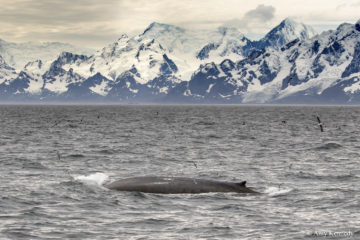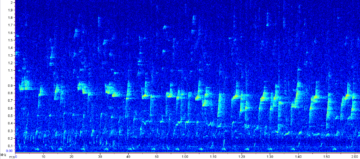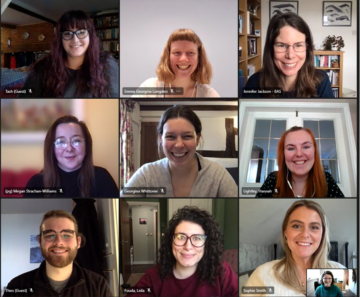WWWARP
Wild Water Whales Acoustic Recovery Project (WWWARP)
- Start date
- 1 January, 2022
- End date
- 30 June, 2024
Sub-Antarctic South Georgia island is a really important feeding ground for whales: it was at the epicentre of commercial whaling in the early 20th century, with over 170,000 whales killed in local waters. Following protection from whaling, whales are once again returning to these waters. A recent survey in 2019 estimated that the island now seasonally hosts over 30,000 whales during the summer months.

Since 2015, the British Antarctic Survey have been listening to whales in sub-Antarctic South Georgia using underwater sound recorders attached to a BAS mooring west of the island (the Western Core Box mooring). Whales regularly call underwater, and for some species like the Antarctic blue whale these calls can be heard over great distances. This year, with help from a team of acoustic interns, British Antarctic Survey and Scotland’s Rural College have been investigating South Georgia whale calls in detail, to learn when different species whales arrive and leave this feeding ground, and to identify the wide variety of other sounds in these recordings, including seal calls and boat noises.
Trainee acousticians Emma Longden, Georgie Whittome, Megan Strachan, Leila Fouda, Tash Fresson, Sophie Smith and Theo Vickers conducted an internship with the British Antarctic Survey and have jointly analysed over 200 hours of sounds so far, from recordings spanning December 2019 to October 2020. They have identified calls from Antarctic blue whales, fin whales, humpback whales, southern right whales, Antarctic minke and sei whales, as well as sounds made by leopard seals and Weddell seals.
BAS scientist Dr Jen Jackson says:
“It’s a thrill to be able to listen in on these whales again, especially in South Georgia where they were so heavily hunted for so many decades. This kind of monitoring is a great way to find out what species are coming to South Georgia and when, especially in those times when people aren’t visiting, in the autumn and winter.”
Check out some of the South Georgia whale sounds here!
Audio Player
This clip from the Antarctic winter includes humpbacks, southern right whales, Antarctic blue whales and fin whales. Below is a spectrogram showing what these calls look like when they are visualised by acousticians.

Dr Sarah Marley, Lecturer in Ecology at SRUC and Lead Acoustician on the project says:
“Working in remote environments like South Georgia presents unique challenges for studying marine mammals. However, passive acoustic monitoring offers an excellent tool to try and overcome some of the logistical difficulties – the equipment can continue collecting data round the clock irrespective of daylight, visibility, or weather conditions. Whales are acoustic specialists, relying on sound to communicate, find food, and avoid predators. By eavesdropping on underwater sounds we can not only study the whales themselves, but also their environment.”
Now that acoustic data review is underway, the next step is to start analysing the patterns of sounds present in the South Georgia marine soundscape. This will form the main component of Sarah Klusendorf’s Masters project, where she will consider the key acoustic contributors to this area and investigate temporal patterns in the acoustic presence of different marine mammal species.
This project was made possible with funding support from the BAS Innovation fund, Foreign Commonwealth and Development Office Blue Belt Program, South Georgia Heritage Trust and Friends of South Georgia Island. Thanks to Dr Iain Staniland for initiating this project, and Dr Sophie Fielding and the BAS marine engineers and Western Core Box krill survey team for deployment and retrieval of the sonovault. Thanks to the Government of South Georgia and the South Sandwich Islands for logistical support.

Legend: From top left: BAS interns Tash Fresson, Emma Longden, project co-lead Dr Jen Jackson, interns Megan Strachan, Georgie Whittome, Hannah Lightley, Theo Vickers, Leila Fouda and Sophie Smith, catching up remotely with lead acoustician Dr Sarah Marley (inset) to discuss whale acoustics.